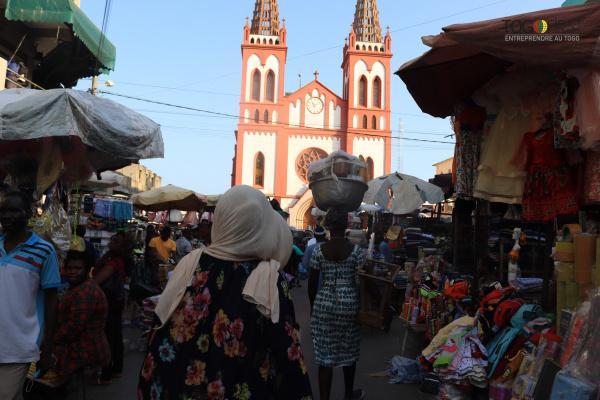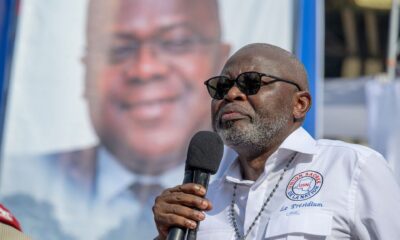Togo’s economy has been resilient and strong during the Covid-19 pandemic. The economy has continued its robust growth trajectory despite the health care and logistics challenges. While some countries in West Africa registered negative economic growth in 2020, Togo’s GDP expanded by 1.8%.
Although this was a stark drop compared to the more than 5% annual growth recorded in the past five years, the IMF and other international groups commended Togo’s performance. Furthermore, Togo has continued to attract foreign direct investment during the pandemic due to the continuous improvement of the business climate, which is a result of five years of aggressive reform and strong government commitment.
For example, it is now possible to set up a business in four hours online with all the required documents in place. Land regulations have been simplified and transfer of ownership is faster. In addition, several financial reforms have stimulated the business environment. As a result, Togo was one of the 10 most improved countries on the World Bank’s 2020 ease of doing business index, jumping 40 places after making it easier to start a business, obtain construction permits, pay taxes, access credit and register property. This progress began in 2019, when Togo moved up 19 places on the index. The performance achieved in 2020 made Togo the top reformer in Africa and the third globally.
GDP growth of 4.8% is expected for 2021, and the average target for the following five years is 7%, reflecting the effects of planned infrastructure projects and related directives. This growth relies on the active participation of the private sector, foreign investors and the restoration of confidence in the broader regional economy.
To what extent did the health crisis undermine the stability of the financial system?
MIVEDOR: During the crisis the Central Bank of West African States took steps to support the regional economy; provide liquidity to areas in need; and ensure that refinancing, restructuring and business support was made readily available. Despite the slowdown in demand caused by lockdowns, movement restrictions and business challenges – particularly prevalent in the airline industry and the tourism sector – financial services proved resilient and responsive to the drop in consumption. The government has taken appropriate measures to support the financial system and weaker businesses in order to maintain a steady level of production and provide financial facilities to firms in need.
Several anchor projects have been implemented despite the economic disruption caused by the pandemic. These projects should build up the ecosystem for small and medium-sized enterprises (SMEs) and propel the economy forwards. The Industrial Platform of Adetikopé (Plateforme Industrielle d’Adetikopé, PIA), which was launched in June 2021, will invigorate SMEs in the surrounding area and provide an array of opportunities to foreign investors seeking exposure to the Togolese economy and the wider ECOWAS market.
Certain projects were conceived and completed during the crisis despite logistics and supply chain challenges. For example, the region’s first data centre opened in Togo in June 2021. The data centre will stimulate the national economy by improving connection speeds, creating jobs, providing new services and generating alternative revenue streams.
What role will special economic zones (SEZs) play in Togo’s future?
MIVEDOR: SEZs are catalysts for industrialisation in Togo and a pivotal part of the country’s economic recovery. Togo has already experimented with free zones and SEZs in terms of job creation, and the government understands the importance of creating spaces where SMEs can expand their operations, gain access to capital and grow. The manufacturing sector – and textiles in particular – is poised to take advantage of SEZs.
The PIA hosts a multidisciplinary zone that services the industrial and logistics sectors, providing entry points to hinterland countries like Burkina Faso, Mali and Niger, and offers a one-stop shop for companies to establish operations in an environment conducive to business. Operationally, the PIA acts as a single point of access to facilitate business transactions and address queries. Together, these features mean lower costs of production for businesses operating out of Togo, as well as a competitive edge against international players.
In terms of job creation, the leading economic segment is the textile industry. We are expecting 15,200 new jobs from the first companies located in the PIA, which will increase to 30,000 in the years to 2026. While cotton is the most important product in terms of value addition and job creation, soybeans and organic soy are up-and-coming niche markets.
In terms of energy availability and cost, the energy mix is maturing to include more green sources and reach a 50:50 mix of renewable and non-renewable power. We are ramping up energy capacity to 100 MW in the surrounding area through the Blitta solar power plant, which currently has 50 MW of clean energy capacity. Togo’s energy quality is high, and the cost relevant to neighbouring countries is competitive. One of the founding principles of SEZs is to create jobs, and efforts are under way to improve energy infrastructure to maintain Togo’s attractiveness in the region and help meet this objective.


 Naira4 weeks ago
Naira4 weeks ago
 Naira4 weeks ago
Naira4 weeks ago
 Travel4 weeks ago
Travel4 weeks ago
 Naira3 weeks ago
Naira3 weeks ago
 Jobs4 weeks ago
Jobs4 weeks ago
 Naira4 weeks ago
Naira4 weeks ago
 Investment4 weeks ago
Investment4 weeks ago
 Travel4 weeks ago
Travel4 weeks ago



























